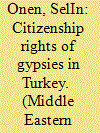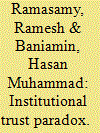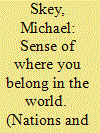|
|
|
Sort Order |
|
|
|
Items / Page
|
|
|
|
|
|
|
| Srl | Item |
| 1 |
ID:
122051


|
|
|
|
|
| Publication |
2013.
|
| Summary/Abstract |
This article compares two different Gypsy communities, the Roma community in Edirne and the Dom community in Diyarbakir, in terms of their access to citizenship rights (civil, social, political and cultural). The main argument is that in Turkey the Roma community has more access to citizenship rights than the Dom community due to the fact that the Roma community lives with Turks, the ethnic majority in Turkey, whereas the Dom community lives with Kurds, who are the majority in Diyarbakir but a minority group in Turkey. Further, the Roma community has closer connections with state and transnational space. The article explains how for both communities ethnicity is a common barrier to benefiting from full citizenship rights and why the equality principle of citizenship is ruptured for both communities.
|
|
|
|
|
|
|
|
|
|
|
|
|
|
|
|
| 2 |
ID:
084904


|
|
|
| 3 |
ID:
131641


|
|
|
|
|
| Publication |
2014.
|
| Summary/Abstract |
This article studies people born in rural China who now live in urban areas of China and possess a residence permit, an urban hukou; these are the hukou converters and they are examined using large datasets covering substantial parts of China in 2002. According to our estimates, there are 107 million hukou converters constituting 20% of the registered population of China's urban areas. Presence of a high employment rate in the city, that the city is small or medium-sized, and that the city is located in the middle or western part of China are factors which cause the ratio of hukou converters in the registered city population to be comparatively high. The probability of becoming a hukou converter is strongly linked to having parents with relatively high human and social capital and belonging to the ethnic majority. Compared to their rural-born peers left behind, as well as to migrants who have kept their rural hukou, the hukou converters have much higher per capita household incomes. Years of schooling and CPC membership contribute to this difference but most of the difference remains unexplained in a statistical sense, signalling large incentives to urbanise as well as to receive an urban hukou. While living a very different life from their peers left behind, the economic circumstances of China's hukou converters at the destination are, on average, similar to the urban-born population. Hukou converters who receive an urban hukou before age 25 do well in the labour market and we have reported indications that they actually overtake urban-born peers regarding earnings. In contrast, hukou migrants who receive an urban hukou after age 25 do not catch up with their urban-born counterparts in terms of earnings.
|
|
|
|
|
|
|
|
|
|
|
|
|
|
|
|
| 4 |
ID:
190163


|
|
|
|
|
| Summary/Abstract |
The article explores institutional trust dynamics in Sri Lanka and asks what accounts for varying levels of trust different ethnic groups have in governance institutions in the post-war context. Three decades of ethnic conflict, the emergence of ethno-religious polarisation since the end of civil war, militarised ethnocracy, and the majoritarian ethnocratic state all highlight the need to understand these dynamics. The article presents the results of twonationally representative surveys on institutional trust in Sri Lanka (2015 & 2020), which showed a puzzling trend: in 2015, minorities had higher trust in public institutions, whereas, in 2020, the same minorities had lower trust. The study finds that citizens’ evaluation of public institutions is affected by ethnic cleavages, institutional fairness, and perceived performance. On the one hand, Sinhala–Buddhist ideology and dominance of ethnic majority in public institutions are more likely to determine institutional trust among the ethnic majority Sinhalese; on the other, perceived injustice and unfair treatment shapes institutional trust among the ethnic minorities. Overall, the study finds that an increase in institutional performance may not be sufficient; institutionalising equal treatment, fairness, and enhancing governance quality are necessary to enhance institutional trust among all ethnic groups in ethnically polarized societies.
|
|
|
|
|
|
|
|
|
|
|
|
|
|
|
|
| 5 |
ID:
099846


|
|
|
|
|
| Publication |
2010.
|
| Summary/Abstract |
The significance of national forms of imagination and organisation has been increasingly questioned in an era of rapid globalisation. While theoretically stimulating, those who stress the importance of global mobility and sociability sometimes overlook what well-established, "thick" attachments to the nation offer to disparate individuals, notably in terms of anchoring subjectivity. This first part of this paper explores how debates around belonging in England continue to define certain "ethnic" groups as more or less national, because they embody certain traits, practices or norms. It is then suggested that those who claim, and are treated as if, they belong "without question" may be offered a key sense of material and ontological security that is underpinned through routine practices, symbolic forms and institutional arrangements. The second section looks to evidence this argument by exploring how challenges to this ontological order, which focus on the agency of "perceived" others in relation to everyday spaces, practices and material objects, are debated and resisted.
|
|
|
|
|
|
|
|
|
|
|
|
|
|
|
|
|
|
|
|
|